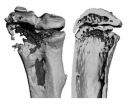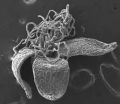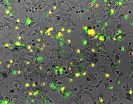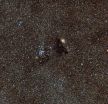(Press-News.org) HOUSTON – (Feb.12, 2013) – New findings by researchers at The University of Texas Health Science Center at Houston (UTHealth) School of Public Health may help identify situations in which smokers who are trying to quit are at a higher risk of relapse.
More than 1,200 people die in the United States every day from smoking-related illnesses. This is equivalent to three airplanes loaded with passengers crashing everyday in America. Smoking-related illnesses are the No. 1 cause of preventable deaths in the country, killing more Americans than drugs, homicides, suicides, accidents, and fires combined.
Previous studies have indicated that alcohol use can increase smoking and smoking urges. However, no studies have examined the moment-to-moment relation between smoking urges and alcohol use during a smoking cessation attempt.
Michael Businelle, Ph.D., assistant professor at The University of Texas School of Public Health, part of UTHealth, and colleagues collected data from 302 female participants between the ages of 18 and 70 who were attempting smoking cessation in Seattle between 1999 and 2002. Businelle and colleagues exclusively focused their study on smoking cessation in women because women have greater difficulty with quitting as compared to men.
Participants recorded their individual smoking urges at random time points throughout the day as cued by hand held computers. Participants also completed temptation assessments each time they felt an urge to smoke.
Overall, subjects reported higher and more volatile smoking urges on days when alcohol was consumed. "Interestingly, these higher, more volatile smoking urges were reported before the individual actually began drinking, suggesting that alcohol consumption may have been in response to smoking urges rather than vice versa" Businelle said. While smoking urge volatility increased following alcohol consumption, the smoking urge trajectory did not.
Additionally, the study showed that women were more likely to drink alcohol on days when they woke up with higher urges to smoke as compared to days when they woke up to lower smoking urges. This finding may indicate that women undergoing a cessation attempt may try to reduce cessation-related stress by using alcohol. This pattern of urges and alcohol consumption could indicate a vicious cycle whereby smoking urges could lead to alcohol consumption, and, in turn, lead to greater urges to smoke and increased likelihood of relapse.
"Identification of situations that increase the risk for relapse will aid in the development of novel interventions that can address these situations in the moment of occurrence," said Businelle.
According to Businelle, "On any given quit attempt, five out of 100 people are successful at quitting 'cold turkey,' 32 percent of those who take varenicline successfully quit, 25 percent of those who use patches and/or gum successfully quit, while those who combine counseling with medications have the best quit rates, greater than 30 percent."
Businelle recommends seeing a physician to assist in smoking cessation, along with the following tips:
Tracking cigarette smoking and urges by time of day and intensity.
Get rid of all lighters, cigarettes and ashtrays.
Participate in exercise or other healthy activities that are not compatible with smoking.
Tell family and friends of your plan to quit smoking, which can build social support for a quit attempt while adding social pressure to quit.
### END
UTHealth: Alcohol consumption may be in response to smoking cessation
2013-02-13
ELSE PRESS RELEASES FROM THIS DATE:
UCSB study of cocaine addiction reveals targets for treatment
2013-02-13
(Santa Barbara, Calif.) –– Scientists at UC Santa Barbara are researching cocaine addiction, part of a widespread problem, which, along with other addictions, costs billions of dollars in damage to individuals, families, and society. Laboratory studies at UCSB have revealed that the diminished brain function and learning impairment that result from cocaine addiction can be treated –– and that learning can be restored.
Karen Szumlinski, a professor in the Department of Psychological & Brain Sciences at UCSB, and her colleagues Osnat Ben-Shahar and Tod Kippin, have worked ...
Emerging cancer drugs may drive bone tumors
2013-02-13
Cancer drugs should kill tumors, not encourage their spread. But new evidence suggests that an otherwise promising class of drugs may actually increase the risk of tumors spreading to bone, according to researchers at Washington University School of Medicine in St. Louis.
The drugs, IAP antagonists, block survival signals that many cancer cells rely on to stay alive. Working in mice, the investigators found that targeting the same protein that makes tumors vulnerable to death also overactivates cells called osteoclasts, which are responsible for tearing down bone.
"These ...
Flu outbreaks modeled by new study of classroom schedules
2013-02-13
Classroom rosters combined with human-networking theory may give a clearer picture of just how infectious diseases such as influenza can spread through a closed group of people, and even through populations at large. Using high-school schedule data for a community of students, teachers, and staff, Penn State University's Marcel Salathé, an assistant professor of biology, and Timo Smieszek, a post-doctoral researcher, have developed a low-cost but effective method to determine how to focus disease-control strategies based on which individuals are most likely to spread the ...
Does race make a difference in monitoring of opioid pain therapy?
2013-02-13
Philadelphia, PA, February 12, 2013 – Opioids are frequently prescribed for pain management in noncancer patients, but recommended clinical guidelines for monitoring effectiveness and signs of drug abuse are often not implemented. Alongside well-documented racial disparities in prescribing opioid medications for pain, researchers report racial differences in the use of recommended opioid monitoring and follow-up treatment practices. The study is published in the current issue of PAIN®.
"In our study, we examined whether racial disparities exist in a more comprehensive ...
Ice age extinction shaped Australian plant diversity
2013-02-13
Researchers have shown that part of Australia's rich plant diversity was wiped out by the ice ages, proving that extinction, instead of evolution, influences biodiversity.
The research led by the University of Melbourne and University of Tasmania has shown that plant diversity in South East Australia was as rich as some of the most diverse places in the world, and that most of these species went extinct during the ice ages, probably about one million years ago.
The team's work was published in the prestigious journal Proceedings of the National Academy of Sciences.
Dr ...
Flood research shows human habits die hard
2013-02-13
New research has come up with ways to quickly assess flood damage to houses while also showing most people didn't intend to make changes to reduce their vulnerability after the 2010-11 floods in Australia.
Two separate reports from the National Climate Change Adaptation Research Facility released today show how lessons learned from households affected by the 2010-11 Australian floods can minimise damage under current and future climates.
The report Analysis of Damage to Buildings Following the 2010 Eastern Australia Floods evaluated the role of development controls ...
Blackbirds in the spotlight
2013-02-13
This press release is available in German.
Street lamps, traffic lights and lighting from homes are causing a rise in our night-time light levels. For some time now, scientists have suspected that artificial light in our towns and cities at night could affect plants, animals and us, humans, too. Studies, however, that have tested this influence directly are few. Scientists from the Max Planck Institute for Ornithology in Radolfzell, Germany, recently investigated how light conditions in urban areas at night affect European blackbirds (Turdus merula). They found that animals ...
Copper depletion therapy keeps high-risk triple-negative breast cancer at bay
2013-02-13
NEW YORK (February 13, 2013) -- An anti-copper drug compound that disables the ability of bone marrow cells from setting up a "home" in organs to receive and nurture migrating cancer tumor cells has shown surprising benefit in one of the most difficult-to-treat forms of cancer -- high-risk triple-negative breast cancer.
The median survival for metastatic triple-negative breast cancer patients is historically nine months. However, results of a new phase II clinical trial conducted by researchers at Weill Cornell Medical College and reported in the Annals of Oncology shows ...
UNC researchers discover gene that suppresses herpesviruses
2013-02-13
Chapel Hill, NC – Kaposi's sarcoma-associated herpesvirus (KSHV) and Epstein-Barr virus (EBV) hide within the worldwide human population. While dormant in the vast majority of those infected, these active herpesviruses can develop into several forms of cancer. In an effort to understand and eventually develop treatments for these viruses, researchers at the University of North Carolina have identified a family of human genes known as Tousled-like kinases (TLKs) that play a key role in the suppression and activation of these viruses.
In a paper published by Cell Host ...
'A drop of ink on the luminous sky'
2013-02-13
This part of the constellation of Sagittarius (The Archer) is one of the richest star fields in the whole sky -- the Large Sagittarius Star Cloud. The huge number of stars that light up this region dramatically emphasise the blackness of dark clouds like Barnard 86, which appears at the centre of this new picture from the Wide Field Imager, an instrument mounted on the MPG/ESO 2.2-metre telescope at ESO's La Silla Observatory in Chile.
This object, a small, isolated dark nebula known as a Bok globule [1], was described as "a drop of ink on the luminous sky" by its discoverer ...




